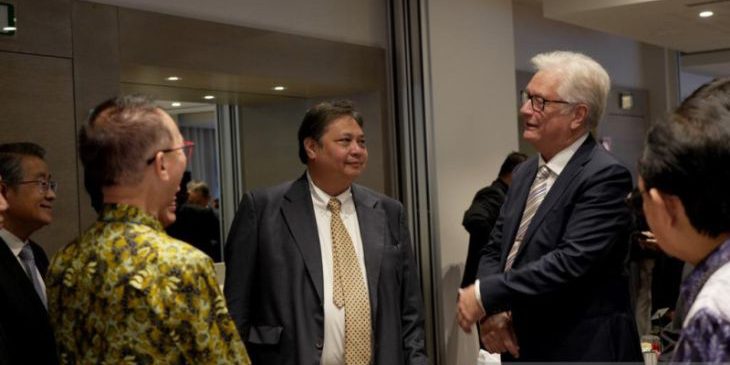Government, through Coordinating Economy Minister Airlangga Hartarto, voiced rejection to the European Union (EU) over palm oil discrimination through EU Deforestation-Free Regulation (EUDR) while meeting with Non-Governmental Organizations’ (NGOs’) and Civil Society Organizations’ (CSOs’) representatives.
“Implementation of the EUDR will clearly hurt and harm plantation and forestry commodities that are so important to us, such as cocoa, coffee, rubber, wood products, and palm oil,” Hartarto noted in Brussels, Belgium, according to an official statement received in Jakarta, Wednesday.
According to Hartarto, the EUDR policy undermined all of Indonesia’s commitments to solving problems related to climate change issues to protecting biodiversity in accordance with multilateral agreements and conventions, such as the Paris Agreement.
“CPOPC (Council of Palm Oil Producing Countries) members have strictly implemented various policies in the field of forest conservation. Even the level of deforestation in Indonesia fell by 75 percent in the 2019-2020 period. Indonesia has also succeeded in reducing the area affected by forest fires to 91.84 percent,” Hartarto noted.
Hartarto sought recognition and pressed for understanding from various parties in the EU for the steps taken by palm oil-producing countries in conducting sustainable production.
“Our message to the European Union is very clear, give us the recognition we deserve,” Hartarto stated.
He also called and urged CSOs and NGOs in Europe to actively speak out and promote palm oil in an objective, transparent, and non-discriminatory manner and be supported by accurate, up-to-date, and reliable data and information.
“Indonesia’s commitment to producing palm oil that meets sustainability requirements and how we solve various issues related to deforestation and climate change have been recognized and set as examples by various international and multilateral organizations,” Hartarto stated
Hartarto pressed for countering the No Palm Oil campaign and emphasized that the role of CSOs and NGOs to fight this negative campaign should be carried out consistently.
On the same occasion, Deputy Prime Minister and Minister of Plantations and Commodities of Malaysia Haji Fadillah Bin Haji Yusof also vouched to continue to support efforts to tackle climate change and reduce deforestation.
During the Q&A session, it was revealed that CSOs and NGOs were also concerned about the latest regulation from the EU.
Some of the inputs and questions raised by CSOs and NGOs included the need for clarification on the form of a consultation platform that will be later established to support the drafting of implementing regulations from the EUDR, so that it will be more practical and less bureaucratic and will not harm small farmers.
In addition, CSOs and NGOs are ready to support Indonesia in dealing with EUDR regulatory issues and their derivatives. This is considering the strategic presence of palm oil that also provides benefits for small farmers. Apart from that, Europe is also known to be absolutely unable to be free from palm oil.
The main provisions of the EUDR have the potential to be detrimental and pose difficulties for small farmers, including the application of geolocation of palm oil land plots and a country benchmarking system that will divide countries into three categories: high risk, standard risk, and low risk.
Regarding benchmarking, Minister Hartarto emphasized that as fellow member countries that are subject to international legal provisions and conventions and agreements, the EUDR provisions have the potential to hinder market access for commodities that are EUDR targets, such as coffee, cocoa, wood, palm oil, and rubber.
The provision will give a negative image to countries classified as high-risk.
The EUDR is a policy that regulates commodities and their impact on deforestation. In this case, the commodities included are soybeans, wood, beef, cocoa, rubber, coffee, and palm oil.
Through the EUDR, the EU stipulates that all operators placing commodities and products on the EU market are required to ensure that they have been produced on land not subject to deforestation by December 31, 2020.
Based on the system implemented by the EUDR, each commodity-producing country will be categorized according to the level of deforestation risk by the EU. In this case, a country can fall into the category of low risk, standard risk, or high risk.










